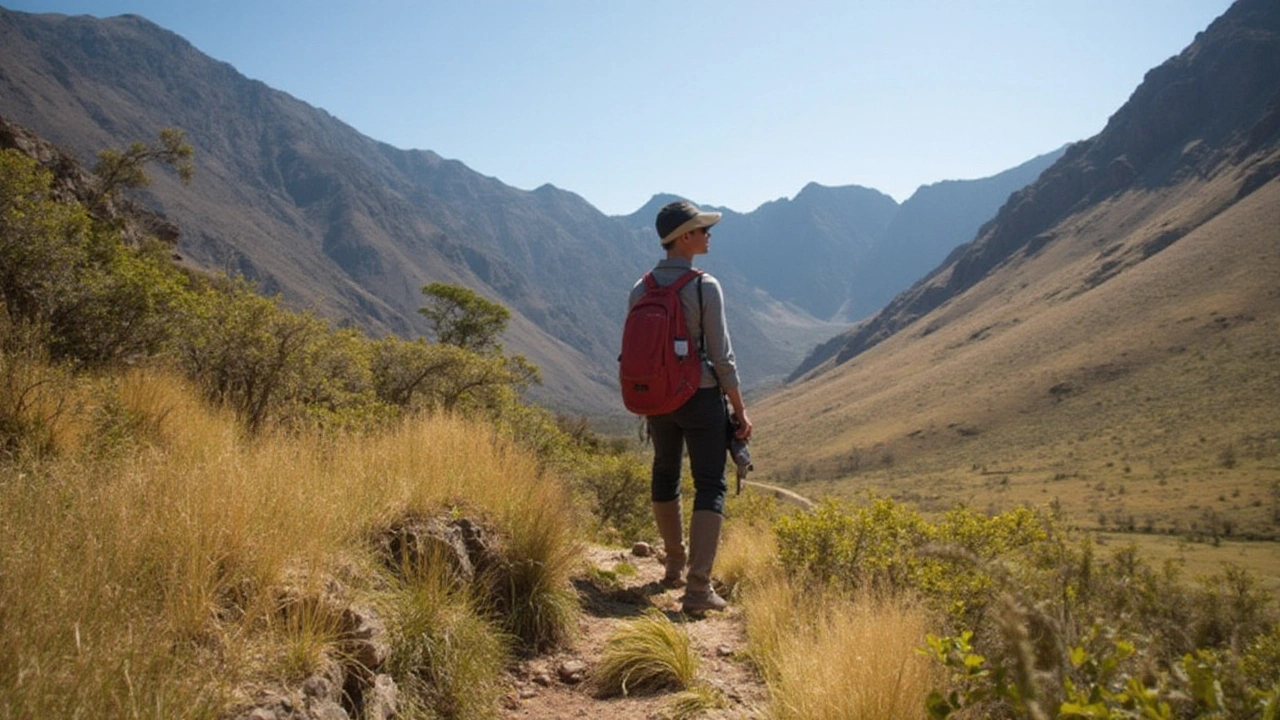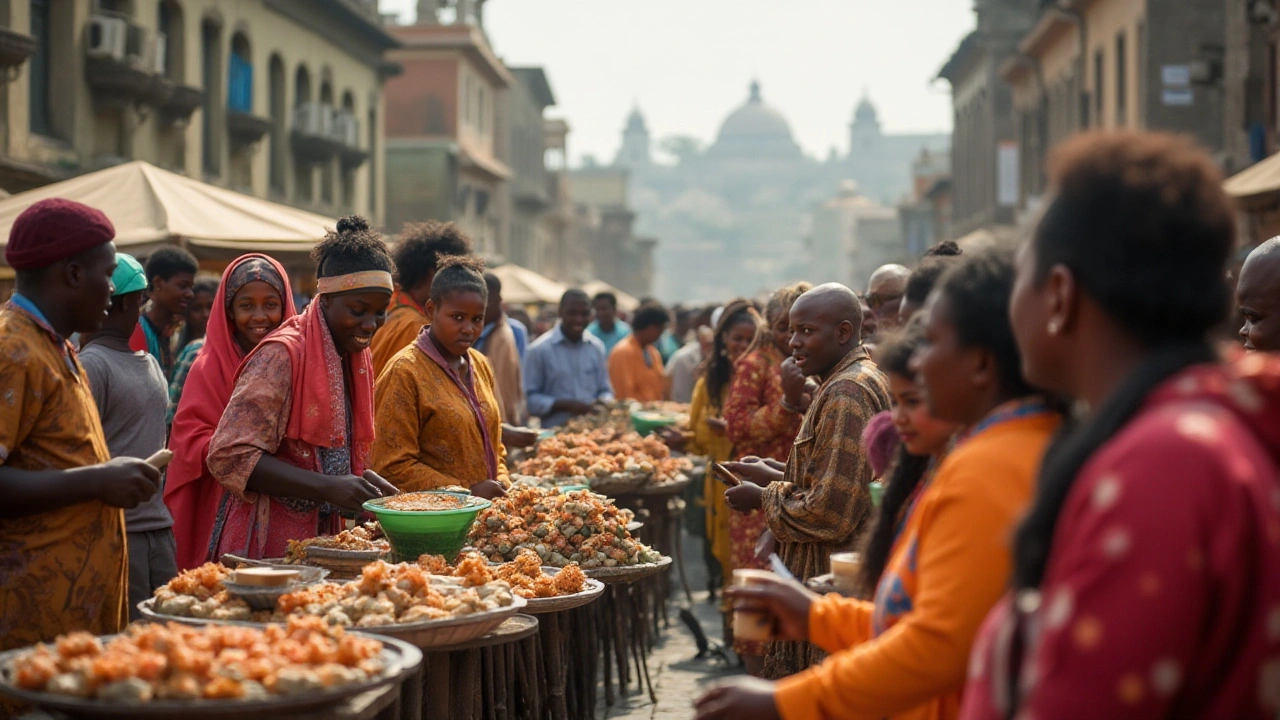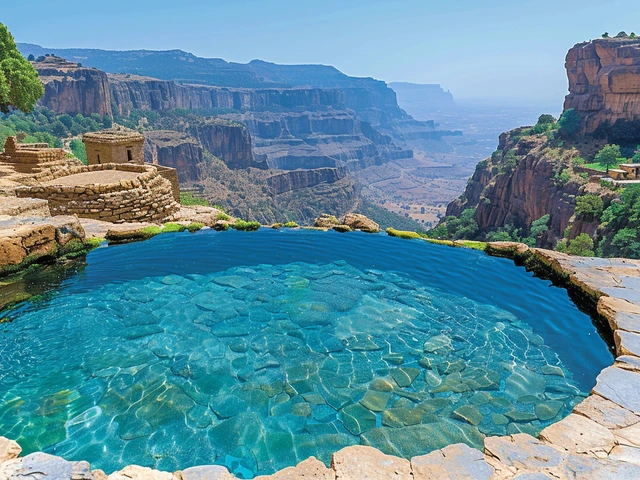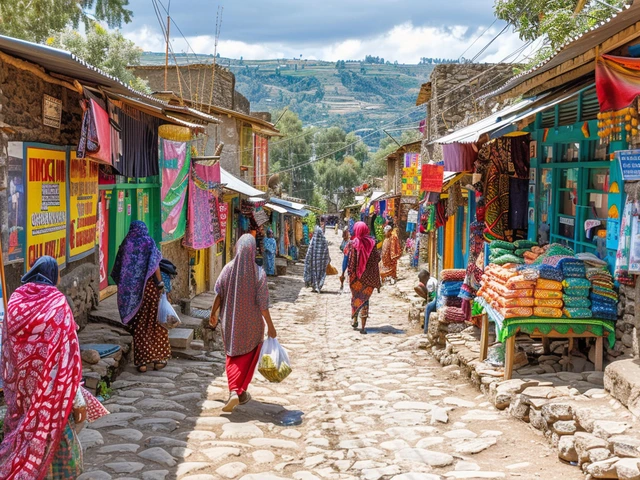Nestled in the horn of Africa, Ethiopia is a land of ancient history, diverse cultures, and breathtaking landscapes. However, like any travel destination, one might wonder about the safety of visiting this fascinating country. In this article, we'll discuss the current safety situation in Ethiopia, providing insights into what you can expect on your visit in 2024.
Current Safety Overview
Ethiopia, with its rich tapestry of cultures and landscapes, has piqued the curiosity of many travelers. But safety is a paramount concern. As of 2024, the country has made substantial strides in improving security, particularly in major tourist areas. Peace talks and agreements in conflict-prone regions like Tigray have significantly lowered the risks.
Authorities now focus intensively on securing popular destinations. Addis Ababa, the bustling capital, remains relatively safe, with an increased police presence in tourist hotspots. The same goes for Lalibela, noted for its rock-hewn churches, and the Simien Mountains, a UNESCO World Heritage site. Even so, it is advised to stay updated on local news and travel advisories.
According to the U.S. Department of State, tourists should 'exercise increased caution' but there is no longer a blanket warning against travel to Ethiopia ([source](https://www.travel.state.gov)).That is a good indicator of gradual improvement. Though street crime in cities should not be overlooked, simple precautions like sticking to well-lit areas at night and avoiding displaying wealth can go a long way.
Humanitarian organizations and government efforts to stabilize the socio-political situation have shown positive results. Newer policies emphasize the safety and well-being of visitors. If you’re planning to visit remote regions, it’s best to consult local guides or tourism offices. These measures ensure that your journey is both extraordinary and safe.
With significant changes underway, Ethiopia is re-emerging as a compelling destination. Travelers are often met with warmth and hospitality, despite prior misconceptions. Awareness and caution can provide a rewarding travel experience in this beautiful nation.
Must-Visit Destinations
Traveling to Ethiopia offers an array of stunning destinations that can captivate any traveler. From historic landmarks to natural wonders, there's something for everyone. One cannot start exploring Ethiopia without mentioning Lalibela. This UNESCO World Heritage site features rock-hewn churches dating back to the 12th century. St. George's Church, carved out of solid rock, is a true marvel of ancient engineering and architecture. Walking through the labyrinth of tunnels and passageways feels like stepping back in time.
Another must-see spot is the Aksumite Empire ruins in Aksum. Known for its ancient obelisks, the site showcases the wealth and ingenuity of one of the most powerful empires in African history. King Ezana's Stone, often dubbed the Ethiopian Rosetta Stone, is a fascinating artifact that gives insights into ancient Ethiopian script and language.
Nature enthusiasts should not miss the Simien Mountains. This national park offers surreal landscapes and is home to unique wildlife such as the Gelada baboon and Ethiopian wolf. Trekking these highland regions reveals dramatic escarpments, deep valleys, and some of the highest peaks in Africa. The views and experiences here are simply unforgettable.
"Ethiopia, with its amazing landscapes and rich history, is truly a destination that should be on every traveler's list," says National Geographic Traveler.
A trip to Ethiopia wouldn’t be complete without experiencing the Danakil Depression. Known as one of the hottest and most inhospitable places on Earth, this area offers striking salt flats, bubbling sulfur springs, and the active Erta Ale volcano. The vivid colors and extreme conditions make it a surreal and otherworldly experience.
The capital city, Addis Ababa, is a bustling metropolis where modernity meets tradition. The National Museum of Ethiopia, home to the famous hominid fossil Lucy, offers a glimpse into the area’s pre-human history. Don't miss the lively Merkato, said to be Africa's largest open-air market, where you can immerse yourself in the vibrant culture and perhaps take home some souvenirs.
The Harar Jugol, a walled city in eastern Ethiopia, is another essential destination. Known as the City of Saints, its narrow alleyways and colorful markets are reminiscent of a bygone era. The evening hyena feeding ritual, a tradition where local men feed meat to wild hyenas by hand, offers a thrilling and unique cultural experience.
Lake Tana, the source of the Blue Nile, offers serene landscapes and island monasteries. Taking a boat trip on this vast lake allows you to visit ancient monasteries, some dating back to the 14th century. These sanctuaries house centuries-old manuscripts and religious artifacts, offering a peaceful retreat for history buffs and nature lovers alike.
For those interested in modern history, the city of Gondar is worth a visit. Often referred to as the Camelot of Africa, it features a series of castle complexes that were once the seat of Ethiopian emperors. Fasil Ghebbi castle complex is particularly noteworthy, showcasing impressive architectural influences from different cultures.
Lastly, the southern region of Ethiopia, particularly the Omo Valley, is a living museum of unique tribes and cultures. Meeting the Hamar, Mursi, and Karo tribes provides a rare insight into a way of life that has remained largely unchanged for centuries. Participating in local festivals or ceremonies can be an enriching cultural experience.

Health Precautions
When planning a trip to Ethiopia, it’s essential to consider your health and well-being as a top priority. First, let’s talk about vaccinations. Travelers are strongly advised to ensure they are up-to-date with routine vaccines such as MMR (measles, mumps, and rubella), DTP (diphtheria, tetanus, and pertussis), and polio. Additionally, vaccinations for hepatitis A, hepatitis B, typhoid, and rabies are recommended due to the potential exposure to illnesses in different regions of the country.
Another crucial vaccination is for yellow fever, especially if you are traveling from or through a country where yellow fever is present. Ethiopia requires proof of yellow fever vaccination upon entry, so keep your vaccination certificate handy. Malaria is another health concern, particularly if you plan to visit lowland regions or areas outside Addis Ababa. It’s advisable to take antimalarial medications and use mosquito repellents and nets to minimize the risk.
"Travelers need to be aware that Ethiopia is partly a tropical country, and the risk of contracting malaria can be significant in certain regions. Taking preventive measures can significantly reduce this risk," advises Dr. Andrew Stein, a specialist in tropical diseases.
Health facilities in major cities like Addis Ababa are generally good, but rural areas might lack adequate medical services. It's advisable to carry a basic first-aid kit containing bandages, antiseptics, painkillers, and any personal medications you might need. Staying hydrated is vital, especially given the hot climate in many parts of Ethiopia. Always drink bottled or purified water to avoid waterborne illnesses.
Diet is another area where caution is necessary. Ethiopian cuisine is delicious but sometimes unfamiliar to the digestive systems of visitors. Start slowly with new foods to see how your body reacts. It is advisable to eat only well-cooked foods and avoid raw vegetables or fruits that you haven’t peeled yourself. This can help prevent gastrointestinal issues that might spoil your trip.
Stay Insured
Investing in a comprehensive travel insurance policy is a must. This should cover medical expenses, trip cancellations, and any unforeseen problems. Having travel insurance provides peace of mind and ensures you can focus on the incredible experiences awaiting you in Ethiopia.
Cultural Etiquette
When traveling to Ethiopia, understanding and respecting the local culture can go a long way in making your trip enjoyable and enriching. Ethiopia is a country with a rich tapestry of traditions and social norms that are vital to grasp for anyone visiting. One of the first things to note is the importance of greetings. Unlike in some Western countries, Ethiopians place great emphasis on formal, respectful greetings. When meeting someone for the first time, a handshake accompanied by a slight bow while maintaining eye contact is customary. Among close friends and family, three kisses on the cheek, starting with the right, are common practice.
Family and community hold significant importance, so you can expect to see a lot of group activities and gatherings. If invited to someone's home, it’s considered polite to bring a small gift, such as fresh fruit or coffee. And speaking of coffee, Ethiopians take their coffee rituals seriously. Coffee ceremonies are an integral part of the culture. When offered, participate graciously as it is a sign of hospitality and respect.
"Coffee is our tradition, we drink it to connect with friends and family- it's more than just a beverage, it's about community." - Dr. Abebe Bekele, Ethiopian Cultural Expert
Another aspect vital to respecting Ethiopian culture is understanding local dress norms. While urban areas like Addis Ababa may have a more relaxed dress code, rural areas tend to be more conservative. Modest clothing is advisable, especially when visiting religious sites. Women are usually expected to cover their hair in Orthodox churches. Removing shoes before entering someone's home or a place of worship is also customary.
Communication styles vary, with Ethiopians generally being indirect in their speech. This means it’s essential to read between the lines and be observant of non-verbal cues. Direct confrontation is often avoided, and people usually go out of their way to maintain harmony and show respect.
Etiquette during meals is another area to be aware of. It’s common to see injera, a type of flatbread, served with various stews and lentils. Traditionally, meals are enjoyed communally from a shared plate, and using the right hand to eat is customary. Wait until your host starts eating or indicates that you should start.
Religion plays a significant role in daily life, with Christianity and Islam being the most widely practiced faiths. Respect for religious practices, such as fasting periods and prayer times, is essential. Observing local holidays and festivals can also provide deeper insights into the Ethiopian way of life.
By embracing these aspects of Ethiopian cultural etiquette, your visit will be far more rewarding. It shows you take an interest in and respect their long-standing traditions, making your interactions more meaningful and enriching your travel experience.

Travel Tips
Travelers looking to explore Ethiopia in 2024 will find that preparation is key to ensuring a smooth and enjoyable trip. First and foremost, make sure your travel documents are in order, including a valid passport and visa. Ethiopians are friendly and welcoming, but it always helps to know a few phrases in Amharic, the most widely spoken language. Though many people in major cities speak English, showing an effort to speak the local language can enhance your experience significantly.
Transportation within Ethiopia can vary from the bustling streets of Addis Ababa to the scenic but rugged roads leading to Lalibela. For safety, it's advisable to use reputable travel agencies or verified apps for booking taxis. If you are planning to use public buses, be ready for an adventurous ride as road conditions can change rapidly. Renting a car with a driver is another popular option, especially for exploring areas off the beaten path.
When it comes to health, taking proper precautions can make all the difference. Make sure to stay hydrated and consume bottled water to avoid waterborne illnesses. Ethiopian cuisine is famous for its spiciness, so if you have a sensitive stomach, start with milder dishes. Don't forget to pack a basic medical kit and any prescription medications you may need. Visiting a travel clinic before departure for necessary vaccinations is a good idea as well.
Immerse yourself in Ethiopia's rich culture by respecting local customs and traditions. Ethiopians take their religious practices seriously, so modest clothing is recommended when visiting sacred sites. Cover your shoulders and knees, and remove your shoes when entering churches. It is also polite to ask for permission before taking photos of people, especially in rural areas where traditional ways of life are preserved.
For those who love the idea of exploring Ethiopia's natural wonders, trekking is a must-do activity. The Simien Mountains offer breathtaking views and are home to unique wildlife like the Gelada baboon. Make sure to hire a licensed guide for such excursions to ensure your safety and enhance your understanding of the region's history and biodiversity. If you’re up for a challenge, Erta Ale, one of the world’s continuously active volcanoes, provides a thrilling experience. However, it is a remote area and requires careful planning and coordination with local guides.
Finally, keep an eye on the local news and travel advisories. While Ethiopia is generally safe for tourists, certain areas may experience political unrest or natural hazards. Register your trip with your home country's embassy in Ethiopia, so they can assist you in case of emergencies. A little bit of caution and preparation goes a long way in ensuring that your trip to Ethiopia is memorable for all the right reasons.

 Understanding Wealth in Ethiopia: An Insight into Salaries and Economic Status
Understanding Wealth in Ethiopia: An Insight into Salaries and Economic Status
 Exploring the Beauty of Ethiopia: A Traveler’s Guide to Its Unique Attractions
Exploring the Beauty of Ethiopia: A Traveler’s Guide to Its Unique Attractions
 Understanding Cultural Etiquette: Respecting Traditions in Ethiopia
Understanding Cultural Etiquette: Respecting Traditions in Ethiopia
 Unpacking the High Cost of Living in Ethiopia: Insights and Explanations
Unpacking the High Cost of Living in Ethiopia: Insights and Explanations
 Top Profitable Businesses in Africa: Revealing the Best Money-Makers
Top Profitable Businesses in Africa: Revealing the Best Money-Makers
pradeep kumar
August 31, 2024 AT 17:43The safety narrative feels like a PR spin, and the article glosses over lingering unrest. Travelers should double‑check every detail before booking.
love monster
September 3, 2024 AT 01:16Great overview! The breakdown of destinations gives a solid itinerary framework, and the health precautions are spot‑on for any backpacker. I especially appreciate the emphasis on local guides-they’re the hidden layer of risk mitigation. The travel‑tech jargon about “real‑time advisories” really helps seasoned nomads stay ahead of the curve. Overall, this reads like a practical field guide for 2024.
Christian Barthelt
September 5, 2024 AT 22:43While the article paints an optimistic picture, there are several factual oversights that deserve scrutiny. First, the claim that “peace talks have significantly lowered the risks in Tigray” ignores the recent flare‑ups reported by independent monitors. Second, the assertion that Addis Ababa’s police presence guarantees safety fails to account for the rise in petty theft targeting tourists in downtown markets. Third, the recommendation to “stick to well‑lit areas at night” is generic and does not address the specific neighborhoods where incidents have spiked. Fourth, the mention of no longer having a blanket U.S. travel warning overlooks that many embassies still advise heightened vigilance in border regions. Fifth, the article’s health section omits that malaria prophylaxis regimes vary by altitude, a nuance critical for lowland trekkers. Sixth, the suggestion of using bottled water does not discuss the prevalence of counterfeit bottles in certain vendor stalls. Seventh, the piece praises local hospitality but neglects to warn about potential scams involving unofficial tour operators. Eighth, the guidance to “carry a basic first‑aid kit” lacks detail on essential items like antidiarrheal medication, which is a common need for visitors adjusting to the local cuisine. Ninth, the reference to the National Museum’s Lucy fossil is accurate, yet it fails to mention the recent security upgrades that have inadvertently created bottlenecks at entry points. Tenth, the description of the Simien Mountains’ wildlife is accurate, but the warning about high altitude sickness is conspicuously absent. Eleventh, the article encourages “registering with your home embassy,” yet does not explain the limited consular reach outside major cities. Twelfth, the cultural etiquette section mentions coffee ceremonies but omits the practice of refusing the first cup, which can be interpreted as disrespect. Thirteenth, the recommendation to “bring a small gift when invited to a home” is sound, but it should clarify that alcohol is generally avoided in Orthodox households. Fourteenth, the travel tips advise “using reputable travel agencies,” yet they do not define what criteria make an agency reputable, leaving newcomers vulnerable to false promises. Finally, the overall tone feels promotional rather than investigative, which undermines credibility for discerning travelers. In sum, the article would benefit from a more balanced risk assessment, precise data points, and actionable safety protocols that go beyond generic advice.
Ify Okocha
September 8, 2024 AT 00:43The health precautions are solid, but the article skips the need for typhoid vaccination for anyone planning to eat street food. Also, relying solely on bottled water is risky if the seal is broken. A quick note on proper wound care would round it out.
William Anderson
September 10, 2024 AT 13:50Honestly, the piece feels like a travel brochure written by someone on a sugar high. The dramatic language about “breathtaking landscapes” is overdone, and the safety disclaimer reads like a disclaimer slapped on the bottom of a novelty T‑shirt. I’d prefer a sober, fact‑based approach.
Sherri Gassaway
September 13, 2024 AT 00:10One could argue that the very act of categorizing cultures into “must‑visit” sections imposes an external hierarchy that distances the observer from authentic experience. Yet, the paradox lies in wanting to guide while preserving spontaneity. The article tries to balance instinct with instruction, but perhaps the true journey begins when the guide is set aside. In any case, respecting the fluidity of tradition is paramount. The reader should remember that travel is as much an inner pilgrimage as a geographic one.
Milo Cado
September 15, 2024 AT 04:56Fantastic breakdown, especially the part about using local guides to navigate remote regions! Your emphasis on cultural etiquette really helps us travel responsibly 😊. Keep the practical tips coming; they make planning a breeze. Thanks for the thorough research and friendly tone.
MONA RAMIDI
September 17, 2024 AT 15:16Seriously, the article’s optimism feels forced. If you’re going to sell Ethiopia as a safe haven, at least address the real dangers head‑on. Travelers deserve raw honesty, not sugar‑coated reassurance.
grace riehman
September 19, 2024 AT 22:50i love how the post keeps it real annd simple. tha safety tips are on point, especially not drinkin tap water. also, big ups for the cultural deets – makes u feel more at home.
Vinay Upadhyay
September 22, 2024 AT 14:43Wow, another “everything’s fine now” narrative. Let’s be real – the security forces are stretched thin, and corruption still pops up in border checkpoints. Travelers who think the situation is crystal clear are setting themselves up for disappointment. The article’s reliance on outdated U.S. State Department statements feels lazy. And by the way, “keep an eye on local news” is advice anyone with a phone already knows. If you want authenticity, drop the PR fluff.
Eve Alice Malik
September 24, 2024 AT 16:43I'm curious about the best time of year to hit the Simien Mountains without dealing with crowds. Also, any tips on local transport options from Addis to Lalibela would be awesome.
Debbie Billingsley
September 27, 2024 AT 03:03As an American, I must stress that respecting Ethiopia’s sovereignty is crucial. Foreign interference often leads to misconceptions about safety. Travelers should prioritize local guidance over external rumors.
Patrick Van den Berghe
September 29, 2024 AT 07:50Agree, but also note that over‑generalizing safety ignores regional nuance.
Josephine Gardiner
October 1, 2024 AT 15:23Thank you for providing a comprehensive and measured analysis of Ethiopia’s current travel environment. The inclusion of health protocols alongside cultural insights demonstrates a commendable level of thoroughness.
Jordan Fields
October 4, 2024 AT 01:43Useful summary.